

Untitled. University of Birmingham - University of the Year for graduate employment. Info Sheet London Univ Coll. History of University College London. University College's main building in the late 1820s, with its classical portico and dome University College London (UCL) was founded on 11 February 1826,[1] under the name London University, as a secular alternative to the strictly religious universities of Oxford and Cambridge.
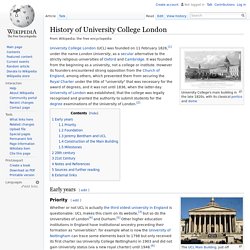
It was founded from the beginning as a university, not a college or institute. However its founders encountered strong opposition from the Church of England, among others, which prevented them from securing the Royal Charter under the title of "university" that was necessary for the award of degrees, and it was not until 1836, when the latter-day University of London was established, that the college was legally recognised and granted the authority to submit students for the degree examinations of the University of London.[2] Early years[edit] Priority[edit] Foundation[edit] However, the attempt to win a charter was blocked by Oxford and Cambridge Universities.
Jeremy Bentham and UCL[edit] Milestones[edit] Notes. University College London. University College London (UCL) is a public research university in London, England and a constituent college of the federal University of London.
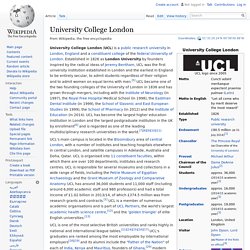
Established in 1826 as London University by founders inspired by the radical ideas of Jeremy Bentham, UCL was the first university institution established in London and the earliest in England to be entirely secular, to admit students regardless of their religion and to admit women on equal terms with men.[5] UCL became one of the two founding colleges of the University of London in 1836 and has grown through mergers, including with the Institute of Neurology (in 1997), the Royal Free Hospital Medical School (in 1998), the Eastman Dental Institute (in 1999), the School of Slavonic and East European Studies (in 1999), the School of Pharmacy (in 2012) and the Institute of Education (in 2014). History[edit] 1826 to 1836 (London University)[edit] 1836 to 2005[edit] UCL - London's Global University.
Royal College of Science Union. Welcome!
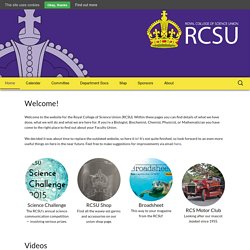
Welcome to the website for the Royal College of Science Union (RCSU). Within these pages you can find details of what we have done, what we will do and what we are here for. If you’re a Biologist, Biochemist, Chemist, Physicist, or Mathematician you have come to the right place to find out about your Faculty Union. We decided it was about time to replace the outdated website, so here it is! It’s not quite finished, so look forward to an even more useful things on here in the near future.
Science Challenge The RCSU’s annual science communication competition — involving serious prizes. RCSU Shop Find all the wavey-est garms and accessories on our union shop page. Broadsheet This way to your magazine from the RCSU! RCS Motor Club Looking after our mascot Jezebel since 1955. Videos We’ll be uploading some interesting science videos for you guys from now on, here’s a couple to give you a taster of what’s to come. Royal College of Science.
History[edit] The Royal College of Science has its earliest origins in the Royal College of Chemistry founded under the auspices of Prince Albert in 1845, located first in Hanover Square and then from 1848 in somewhat cheaper premises in Oxford Street.
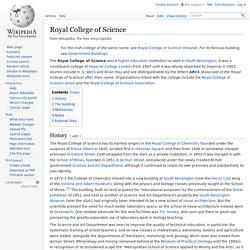
Cash-strapped from the start as a private institution, in 1853 it was merged in with the School of Mines, founded in 1851 in Jermyn Street, and placed under the newly created British government Science and Art Department, although it continued to retain its own premises and substantially its own identity. The Science and Art Department was keen to improve the quality of technical education, in particular the systematic training of school teachers, and so new classes in mathematics, astronomy, botany and agriculture were added, alongside the departments of mechanics, metallurgy and geology which soon also moved from Jermyn Street. Imperial College London. Imperial College London. Imperial College London is a public research university located in London, United Kingdom.[5] Its royal patron and founder, Prince Albert, envisioned an educational area in South Kensington, that included museums and scientific and arts institutions.[6][7] The Imperial Institute was opened by his wife, Queen Victoria, who laid the first brick.[8] Imperial College was granted a royal charter by their son King Edward VII in 1907, as a specialist college in science and engineering of the federal University of London.
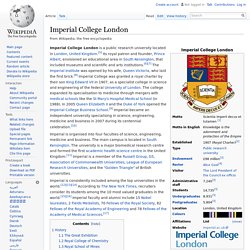
The college expanded its specialisation to medicine through mergers with medical schools like the St Mary's Hospital Medical School (in 1988).